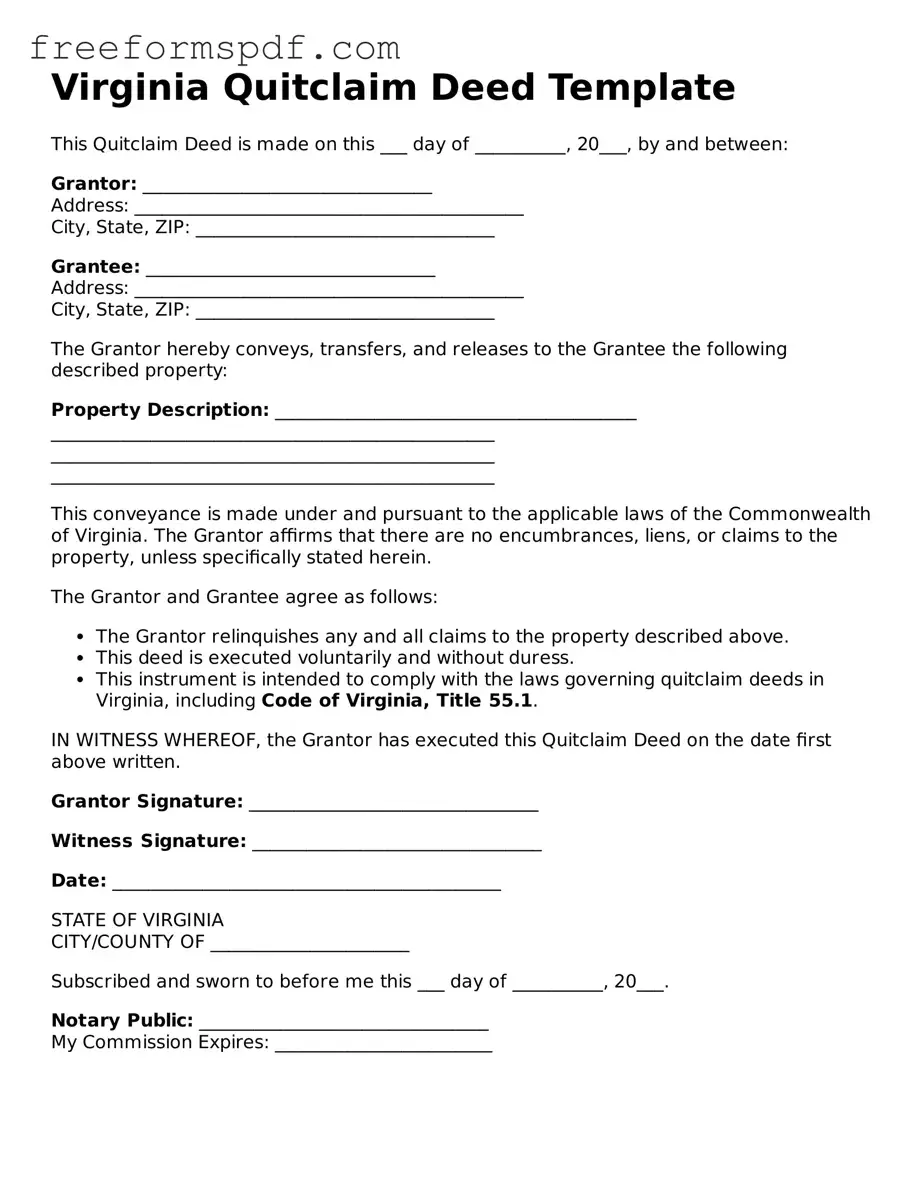Attorney-Verified Quitclaim Deed Document for Virginia State
Common mistakes
-
Incomplete Information: Failing to provide all required details can lead to delays. Ensure that names, addresses, and property descriptions are fully filled out.
-
Incorrect Property Description: A vague or inaccurate description of the property can cause legal issues. Use the legal description from the property’s deed.
-
Not Notarizing the Document: A quitclaim deed must be notarized to be valid. Without a notary’s signature, the document may not be enforceable.
-
Ignoring State Requirements: Each state has specific rules regarding quitclaim deeds. Make sure to follow Virginia's regulations to avoid complications.
-
Failure to Record the Deed: Simply filling out the deed is not enough. You must record it with the local clerk’s office to make the transfer official.
-
Not Considering Tax Implications: Transferring property can have tax consequences. Consult a tax professional to understand potential liabilities.
-
Overlooking Witness Requirements: Some transactions may require witnesses. Check if your specific situation necessitates additional signatures.
Learn More on This Form
-
What is a Quitclaim Deed?
A Quitclaim Deed is a legal document used to transfer ownership of real estate from one party to another. Unlike other types of deeds, it does not guarantee that the grantor (the person transferring the property) has clear title to the property. Instead, it simply conveys whatever interest the grantor has, if any.
-
When should I use a Quitclaim Deed?
This type of deed is often used in situations where property is transferred between family members, such as during a divorce or inheritance. It is also useful for clearing up title issues, where the grantor wants to relinquish any claim they may have on a property.
-
What information is needed to complete a Quitclaim Deed?
To complete a Quitclaim Deed in Virginia, you will need:
- The names of the grantor and grantee.
- A description of the property being transferred.
- The date of the transfer.
- Any necessary signatures, typically from the grantor.
-
Do I need to have the Quitclaim Deed notarized?
Yes, in Virginia, a Quitclaim Deed must be notarized to be legally valid. This means that a notary public must witness the signing of the document and affix their seal to it.
-
How do I record a Quitclaim Deed in Virginia?
After the Quitclaim Deed is signed and notarized, it should be recorded with the local county clerk's office where the property is located. This step is crucial because it provides public notice of the ownership change and protects the rights of the new owner.
-
Are there any fees associated with filing a Quitclaim Deed?
Yes, there are typically recording fees that vary by county. It's important to check with the local clerk’s office for the exact amount. Additionally, there may be tax implications, so consulting with a tax professional is advisable.
-
Can a Quitclaim Deed be revoked?
Once a Quitclaim Deed is executed and recorded, it generally cannot be revoked. However, the grantor may choose to create a new deed to transfer the property back or to another party. Legal advice may be necessary in complex situations.
-
What are the risks of using a Quitclaim Deed?
The primary risk associated with a Quitclaim Deed is that it does not provide any warranties or guarantees about the property title. If there are existing liens or claims against the property, the grantee assumes those risks. Therefore, it is wise to conduct a title search before proceeding with this type of deed.
Misconceptions
-
Misconception 1: A quitclaim deed transfers ownership of the property.
While a quitclaim deed does transfer interest in a property, it does not guarantee that the grantor actually owns the property. The grantor may have no legal rights to the property at all. This type of deed simply conveys whatever interest the grantor has, if any.
-
Misconception 2: A quitclaim deed is only used in divorce situations.
Although quitclaim deeds are often utilized to transfer property between spouses during a divorce, they are not limited to that scenario. They can be used in various situations, such as transferring property to family members, settling an estate, or correcting title issues.
-
Misconception 3: A quitclaim deed eliminates all liabilities associated with the property.
This is not true. A quitclaim deed transfers ownership but does not absolve the grantor from any existing liabilities, such as mortgages or liens on the property. The new owner may still be responsible for these obligations.
-
Misconception 4: Quitclaim deeds do not require notarization.
In Virginia, like many other states, a quitclaim deed must be notarized to be legally valid. This step ensures that the signatures on the deed are authentic and that the parties involved have willingly agreed to the transfer.
-
Misconception 5: A quitclaim deed can be used to clear title issues.
A quitclaim deed does not clear title issues; it merely transfers whatever interest the grantor has. If there are existing claims or disputes regarding ownership, these must be resolved through other means, such as a warranty deed or legal action.
Some Other Quitclaim Deed State Templates
Quit Claim Deed Oregon - The Quitclaim Deed can be an efficient tool for family property transfers.
For those navigating the complexities of tax certifications, understanding the New York DTF-84 form is vital, as it allows businesses to apply for Qualified Empire Zone Enterprise (QEZE) Sales Tax Certification. By completing this form, businesses recognized by Empire State Development can access significant sales tax benefits. To aid in this process, resources such as NY Templates can provide valuable guidance, ensuring all necessary documentation is properly submitted and processed.
Printable Quit Claim Deed Form - A Quitclaim Deed is often used in estate planning to transfer property upon death.
